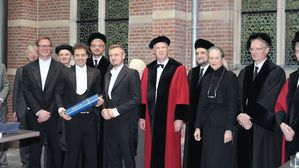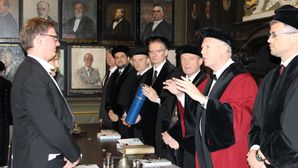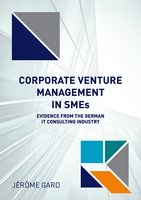Small and medium-sized enterprises (SME) provide jobs for more than 65 million people in Europe and yet are insufficiently prepared for the dynamics of their globally interconnected markets: Strategic competence is not very pronounced, strategic decisions are made informally and subjectively, so that business plans often fail. However, if companies use strategic planning in a dynamic environment, they are more likely to survive. Large companies implement such strategic planning systems partly by reducing complexity and using information and communication technologies. However, the transfer of these experiences and systems from large-scale industry to SMEs is missing. Therefore, this project aims to develop a solution for processes and systems integrated strategic planning tailored to SMEs and to make it usable for SMEs. Existing application hurdles will be addressed and risk management activities will be integrated into an integrated approach. The scientific objective is to gain organisational and engineering knowledge on the design of integrated strategic planning solutions by transferring experience from large-scale industry and thus to make an empirically sound contribution within the conceptual framework of dynamic capabilities.
Overview
iPlanPro is a research project evaluated by the Federal Ministry of Education and Research (BMBF) and rewarded with funding in the "FHprofUnt" programme for the development of an overall solution for the use of integrated strategic planning in medium-sized technological enterprises. From 2010 to 2013, the project team developed instruments to improve the strategic planning capabilities of medium-sized companies. This resulted in the following management instruments:
- Instrument for computer-aided simulation of the impact of risk dimensions on strategic financial planning
- Strategic early warning system for the exploration of weak signals in the corporate environment
- Instrument for operational early recognition on the basis of the Balanced Scorecard
- Simulation tool for the rational-analytical evaluation of strategic investment options
These instruments have been successfully tested and implemented in numerous consulting projects (among others with Schöttli AG, Sulzer Ltd, Benz GmbH).
Details
- Research Team
University of Applied Sciences Konstanz
CeTIM München - Center for Technology and Innovation Management
CeTIM GmbH is a research institute of the Faculty of Aerospace at the University of Bw in Munich. The competencies of the institute are based on the interdisciplinary background of its international staff in the field of Dynamic Capabilities and Living Lab Infrastructure. The research contribution lies in the scientific support and resources as well as access PhD program for the scientific staff of the project (Mr. Gard), contribution of know-how and intellectual property from predecessor projects (Deutsche Bahn AG, Siemens AG).
Project Partners
SIDLER AUTOMOTIVE GmbH & Co. KG
SIDLER AUTOMOTIVE has been a system and development supplier of comfort and safety components for interior lighting and fittings for over 80 years. Competencies lie primarily in the areas of research, development, design and project management as well as toolmaking and logistics. SIDLER AUTOMOTIVE develops and produces in Europe with the aim of combining the highest standards of ergonomics, design, quality and comfort. Its customers include major automobile manufacturers and system suppliers worldwide. Many of these business relationships have existed for decades. The research contribution includes own tasks, access for analyses and resources for validation.
Giesecke & Devrient GmbH
Giesecke & Devrient (G&D) is a family-owned, internationally leading technology group that until recently was family-owned. Founded in 1852, G&D is a global market and innovation leader in the production and processing of banknotes and banknote papers, smart card-based solutions for telecommunications and electronic payment, and security documents and ID systems. G&D is a group with a strong international focus. Technology provider for banks and government agencies. The research contribution includes own tasks, access for analyses and resources for validation.
Noetzold & Noetzold
The software and consulting firm Noetzold & Noetzold (N&N) is the market and technology leader in the field of enterprise-wide strategic risk management systems. Its competencies include corporate risk management systems and consulting services. N&N focuses its product development and consulting on high quality, modern technology and maximum customer benefit. Due to its qualitative products and extensive experience in risk management, the company has an excellent reputation in the field of risk management.
SOLYP Informatik GmbH
Solyp - developer of software solutions was founded in 1996 and has specialized in the further development of its Solyp architecture platform for enterprise-wide information management. Based on this architecture Solyp developed the solution suite MCMS. Based on this technical foundation, software for strategic planning was developed individually for Siemens AG, Metro AG and Deutsche Bahn AG. This software relies on numerous innovative components of MCMS. Solyp has its headquarters in Nuremberg (Solyp Informatik GmbH) with branches in Munich and Hanover (Solyp Technologie GmbH). The research contribution includes the software solution for strategy workflow, experience in projects at Metro AG, REWE AG and development/customizing capacity.
- Research Methodology
The project is structured according to the research approach of action research. The advantage of this method lies in the simultaneous creation of practical solutions, i.e. application-oriented innovation and theoretical findings. The approach of the project is derived from this. In two cycles, first the problems of SMEs are analysed and then solutions and improvements are developed, which are practically implemented and tested in a third step: In the first phase, the preliminary work carried out by the university and the CeTIM research institute as well as the know-how of the cooperation partners are examined and oriented towards the tasks of the project. In the second phase, the actual innovations will be developed in two action learning cycles. The action aspect clearly emerges in the case studies, the learning aspect in the accompanying preparation of methods/training documents and discussion in forums and the experience circle. In the third phase of the project, the focus is on securing the results through in-depth analysis, publication/ communication and the creation of "best practice" manuals. The special thing about this type of cooperation is the fast feedback cycles (i.e. non-linear progress), which at the same time increase the complexity of the project: There are no sequential phases with completed results, but several work packages are active in parallel and mutually enrich each other in the successful project. In addition to the eArchitecture Lab as the technical infrastructure, active project management is required to coordinate the interests of the partners and the research process. Another important prerequisite is the preparation of the first cycle by the project team and the cooperation partners. In concrete terms, the project team is involved:
- A first generation of workflow-oriented software for strategic planning (SOLYP)
- A first generation of simulation-oriented software for strategic risk management (Nötzold & Nötzold)
- Evaluation experience in Living Lab infrastructure (HTWG, CeTIM)
- First generation of process and model descriptions (CeTIM, HTWG)
- Experience from implementation projects and application in large industrial companies (Solyp, Nötzold & Nötzold, CeTIM)
In addition, the project follows an open innovation process with the support of the Living of the HTWG Konstanz (Konstanzer Labor für Führungssysteme). Open Innovation involves the cooperation on a common topic between different partners such as SME user companies, technology and implementation partners as well as research institutions. The goals of the respective partners will be used for the common purpose. In the present case, the aim is to solve a concrete industrial problem - the strategic planning weakness of small and medium-sized companies - and at the same time achieve scientific insights as previously explained.
- Results
The results can be differentiated according to their industrial and scientific relevance.
Results with industrial relevance:
An application-oriented iPlanPro overall solution for the implementation of integrated strategic planning was developed, which consists of 3 modules:
- Reference concept for integrated strategic planning
- Library of SME-suitable software tools
- Strategies and procedures
This solution not only improves the strategic competence of SMEs, but also optimises liquidity requirements and improves access to capital. This enables SMEs to achieve innovation-oriented, organic growth with lower financing costs, faster strategic responsiveness and risk reduction.
Results with scientific relevance:
- Empirical supported contribution to dynamic capabilities
- Integrated risk-adjusted strategic planning as an example of dynamic capabilities
- Combining organizational theories with strategic and engineering theories
- Dissertation

In his doctoral thesis entitled "Corporate Venture Management in SMEs - Evidence from the German IT Consulting Industry", Mr. Gard developed and tested an innovative management concept for the development of new business fields by (partially) autonomous entrepreneur teams. Among other things the research results find application in the Best Practice group „SIG Excubation“ created later. Here the focus lies on the Reintegration of entrepreneur teams (spin off) into the nut/mother organization (spin in) and/or their continuation as independent enterprises (spin out).
- Publications
- Gard, J., Baltes, G., Wehle, D., Katzy, B. (2013): An Integrating Model of Autonomy in Corporate Entrepreneurship, 2013 IEEE-ITMC & 19th ICE conference, The Hague (NL)
- Gard, J., Baltes, G., Katzy, B. (2013): Managing autonomy of teams in Corporate Entrepreneurship - Evidence from small and medium firms, Technology and Innovation, 22nd International IAMOT conference, Porto Alegre (BR)
- Gard, J., Baltes, G., Katzy, B. (2012): Towards a concept of autonomy for teams developing a new business within existing companies. Paper presented at the Engineering, Technology and Innovation (ICE), 2012 18th International ICE Conference on
- Gous, H., Gard, J., Baltes, G., Schutte, C., Gerber, A. (2011): Business architecture for inter-organisational innovation networks: A case study comparison from South Africa and Germany, Concurrent Enterprising (ICE), 2011 17th International Conference on , vol., no., pp. 1-11, 20-22 June 2011

